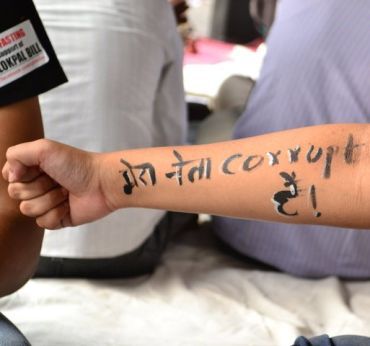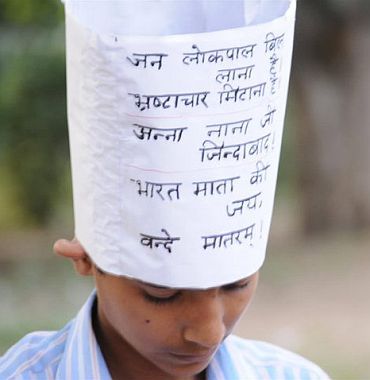 | « Back to article | Print this article |
The term 'civil society' has been used and abused
The time has come for the government of the day to stop behaving like a supplicant before self-appointed representatives of civil society
The term 'civil society' has been used and abused at will these past few months in India.
In a clever coup staged with the active involvement of a section of the media, a clutch of social activists and retired civil servants was allowed to project itself as "a representative of civil society".
A confused government, a directionless ruling alliance and a revenue-hungry media allowed this dubious claim to go unchallenged, portraying a few good men and women as the people's voice.
The elected representatives chosen by the people to be their voice in Parliament virtually abdicated their constitutional responsibility, allowing the so-called "civil society" leaders to fill the vacuum created by the absence of an organised parliamentary discourse on issues pertaining to corruption in high places.
Click on NEXT to read further...
That messy compromise called Lokpal
Every political party -- in government and in opposition -- is equally guilty of this.
By disrupting Parliament, its members drove the debate into television studios. Out of this cacophony came a compromise whose damaging impact on the legitimacy of constitutional democracy may be far greater than is currently imagined.
This messy compromise was the so-called Lokpal Bill drafting committee.
For all their commitment to the institution of a non-political ombudsman called 'Lokpal', the so-called civil society representatives in the drafting committee saw nothing incongruous in a sitting Lokayukta of a state actively participating in a semi-political exercise, appearing in the media and making semi-political comments and the like.
It is time for the government and Parliament to do their job
These are minor sins compared to the larger claim that a bunch of five people will speak for India, and if the duly elected and constitutionally constituted government of the day will not accept their view of things, then there is no space for democratic disagreement, only a call for another hunger strike.
Every Indian has the right to fast, but the law of the land denies the citizen the right to fast unto death.
Let Mr Hazare have his fast. It is time for the government and Parliament to do their job.
The all-party meeting scheduled for July 3 may or may not take a final view on which draft of the Lokpal Bill should go to Parliament. It is the responsibility of the Union Cabinet.
Making a mockery of democracy
Once the draft Bill is placed in Parliament, the elected representatives of the people will have the last word on the subject.
Their view will and must prevail, even if it does not satisfy a vocal minority of citizens.
To call such a legally constituted entity a "joke-pal" merely because one does not like the shape and personality of that entity is to mock democracy.
No democracy can function pandering to the prejudice and tyranny of a minority, howsoever altruistic its motives.
Indeed, those who believe in real democracy must also allow for the view to be articulated, even if they disagree with it, that there may be no need for the creation of a new institution like the Lokpal, be it a "Lokpal strong" or a "Lokpal lite".
All-powerful Frankenstein could destroy democracy
A democratic nation with a corrupt government, some may believe, is better than a corruption-free government that is non-democratic.
In recent years, democracies around the world have seen individual rights curtailed in the name of a war on terrorism. It would be a sad day for India if democratic institutions are rendered paralysed in the name of a war on corruption.
Government must stop behaving like a supplicant
A democratically-elected government is, in fact, the constitutional manifestation of the people's collective will. There is a job to be done by both the government and Parliament and they must do it without fear or favour.
If in its wisdom Indian Parliament accepts or rejects a certain version of the institution of Lokpal that most do not like, the people of India have the right to elect a new Parliament that will do what they want. No one needs to forego a meal for that.






